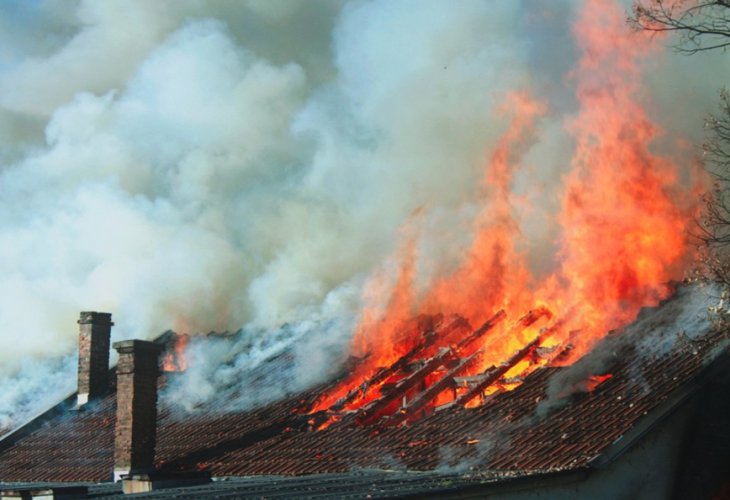Personal Stories
Miracles in the Flames: Haifa Survivors See Hashem’s Hand
In the face of destruction, residents of Haifa share powerful stories of survival, faith, and miracles they witnessed during the massive wildfire.
 (Illustration photo: shutterstock)
(Illustration photo: shutterstock)A moving article was published in Yated Ne'eman, collecting powerful firsthand accounts from the devastating Haifa fire. These are stories filled with kindness, divine providence, deep faith, and even joy in the midst of painful loss.
"Entire buildings went up in flames, and people survived. It’s beyond nature."
“People don’t understand what really happened here,” says Rabbi Moshe Adler, chairman of United Hatzalah in Haifa. “A cruel and fierce fire spread through the city, threatening to consume everything. Whole buildings were engulfed in flames. What we saw can’t be described in words. Nothing that happened here can be taken for granted. These were open miracles. Some of the apartments were home to individuals with special needs who couldn’t evacuate on their own. We saw miracle after miracle unfold in terrifying moments. We must know this and give thanks and praise to the Creator.”
Rabbi Adler, who also serves as the manager of the Rechasim Council Head’s office, was deeply involved in rescue efforts and shared his emotional testimony with the newspaper.
“We saw Hashem’s hand guiding us every step of the way. For example, we were sent to evacuate residents on Deker Street. The fire was raging. Just as we left the building, the flames reached the yard. Had we been delayed even seconds, it could have ended differently. These were back-to-back miracles.”
“The fact that no one died in so many of the apartments and buildings that burned down is not natural. Anyone who felt the fire chasing after them understands it was Hashem’s protection. There’s no other explanation.”
“Why are you comforting me? We’re alive. That’s what matters.”
Rabbi Yaakov Rosenberg shares another story, this one close to home. His elderly mother-in-law, over 80 years old, lived in Haifa’s Romema neighborhood. Her apartment was completely destroyed in the fire.
“She was spending Shabbat with us in Jerusalem,” Rabbi Rosenberg says. “The grandchildren were trying to console her, but she stopped them. ‘Why are you consoling me? Is this a funeral?’ she asked. ‘The house burned down, we’re alive. We will continue forward with Hashem’s help.’ She spoke with incredible strength and faith.”
Later that week, the family traveled to Haifa to see the damage. “We noticed something strange,” he says. “My mother-in-law’s apartment was totally destroyed, but the one next to it was untouched. This same pattern repeated itself in several buildings. You couldn’t help but feel that this was the hand of Hashem.”
“My whole house burned down except for the Chanukah menorah.”
Rabbi Rosenberg shares another moment that left him speechless. “When we arrived in Haifa, a non-religious man came over to me, clearly shaken. He said, ‘I have to tell you something. My entire home was burned to ashes except for one item. The Chanukah menorah.’”
A simple garden hose, a massive miracle
A United Hatzalah paramedic shares his experience: “I live in the Achuza neighborhood, but I was working in Romema when I saw the flames burning uncontrollably. I came home around 1:00 p.m. and was shocked, our neighbor’s pergola was in flames, and our storage room was burning. I had no idea where I found the strength. The main hose had already burned, so I grabbed a small garden hose and tried to stop the fire.”
For nearly two hours, he battled the flames alone until more help arrived. “By 3:30, we managed to prevent the fire from reaching the building. That was only through Hashem’s help. Our storage room was full of flammable materials. That little hose had no power on its own. It was clearly a miracle.”
“Do we need a city in flames to feel others' pain?”
The article from Yated Ne’eman doesn’t just tell stories. It asks us to reflect.
“A home isn’t just walls and furniture,” the writer says. “Thousands lost not just property, but the heart of their homes, the memories, the personal items that can’t be replaced. How do you assess the value of a father’s old set of Talmud, pages carried away by the wind? Or a mother’s embroidered tablecloth passed down through generations? What about a grandfather’s letter or the scent of an old siddur (prayer book)?”
“How can you put a price on paintings an artist refused to sell because he saw them as pieces of his soul? How do you compensate someone for losing a home filled with memories, gifts, photos of family and teachers, children and grandchildren?”
The reporter then challenges us to think beyond the fire: “Will we at least feel their pain? Or will we stay distant, detached, just reading the headlines? Maybe this tragedy can awaken something deeper in us.”
“Perhaps we don’t need fires or ‘Super Tankers’ to notice that sometimes, right nearby, a home is falling apart, a family is struggling. Maybe a neighbor is silently going through their own personal disaster and we’ve walked by without noticing. Let’s not wait for dramatic scenes. Sometimes just a small act of kindness can bring light to someone else’s darkness.”
Finally, the article reminds us of the timeless words of the Chafetz Chaim: “One who understands will recognize that such tragedies do not come by chance. They are wake-up calls from Heaven, urging us to return to the right path and correct our deeds. We are not immune. When we take a close look, we’ll see there are many areas where we can improve…”

